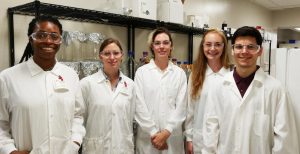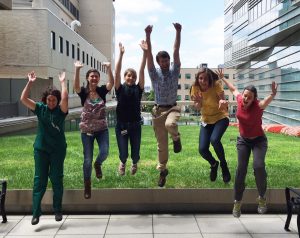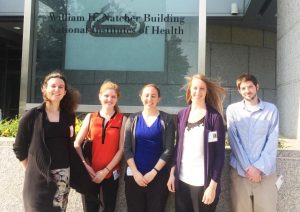Veterinary Research Scholars Program at Johns Hopkins University
The Johns Hopkins University Department of Molecular and Comparative Pathobiology is pleased to offer six Veterinary Scholars Program fellowships for veterinary students. This is a paid summer research fellowship for veterinary students who have completed their first or second year of veterinary school. Research Scholars will spend 12 weeks doing cutting edge translational research with faculty at our world-renowned biomedical research university.

Available Research Topics
Eligible host labs are led by proven mentors, and detailed information on research directions can be found on our webpage (http://mcp.bs.jhmi.edu/people). You will be asked to rank 3 research concentrations that interest you from the list below, and you will be matched with a mentor.
- Infectious disease
- Immunology
- Cancer biology
- Genetics
- Neurology
Recent veterinary student summer fellows at Johns Hopkins University have done research involving the properties and content of extracellular vesicles in HIV infected patients, developed a novel assay for the detection of residual virus in SIV infected macaques with undetectable plasma viral loads, and defined the role of erbB2 in the pathogenesis of cardiac dysfunction.

Organized Activities for Veterinary Scholars
In addition to lab meetings and seminars pertinent to your summer research project, Scholars will participate in:
- Coffee and Careers Chats (weekly): In conjunction with our Summer Pathology and Laboratory Animal Medicine Fellows and current veterinarian-trainees, Research Scholars will have an opportunity to meet with accomplished veterinarians in research careers over coffee to talk about their research, their career paths and how their veterinary training has helped to achieve their goals.
- Departmental Activities in Pathology and Laboratory Animal Medicine (weekly): In conjunction with our Summer Pathology and Laboratory Animal Medicine Fellows and current veterinarian-trainees, Research Scholars will have the opportunity to attend our weekly pathology slide conference (1 hr/wk), laboratory animal medicine rounds (1 hr/wk) and integrated pathology / medicine case reviews (0.5 hr/twice weekly).
- Field trips to other research facilities such as The National Institutes of Health in Bethesda, MD and local pharmaceutical companies.
- A formalized Career Peer mentoring program that pairs Scholars with current veterinarian-trainees who have similar career interests.
- Social outings for Scholars, Summer Pathology and Laboratory Animal Medicine Fellows and current veterinarian-trainees early in the program.
Fellowship and Application Dates
The program starts May 23, 2022 and continues for 12 weeks. Veterinary Scholars Fellows will join a community of five other veterinary students engaged in this program and twelve veterinarian fellows with interest in research, laboratory animal medicine, and/or comparative pathology in the department. The program includes multiple organized professional development activities. Research Fellows are encouraged to take vacation before or after the fellowship dates, however there will be flexibility in the start date for students whose academic year ends later than May 23, 2022. This program provides a weekly stipend of approximately $538 through NIH support. Students will not be able to be a part of another NIH supported program simultaneously while being supported by Johns Hopkins University NIH support.

Fellowship Stipend
You will receive a weekly stipend of approximately $538.
Working With Other Veterinarians
Johns Hopkins is home to a vibrant community of veterinarians working in biomedical research and typically recruits 7 Veterinary Scholars every summer. We will also be hosting 2 veterinary students as Summer Comparative Pathology Fellows and 1 as a Summer Laboratory Animal Medicine Fellow.. We currently have 3 residents in Laboratory Animal Medicine, 1 resident in Comparative Pathology, 10 veterinarians pursuing postdoctoral fellowships in research and 5 DVM, PhD faculty members.
Where To Live During Your Fellowship
We recommend looking for sublets through the Johns Hopkins University School of Medicine off campus housing site, and we will put incoming Research Scholars in touch with current trainees to aid in their evaluation of housing options.
Life In Baltimore
Baltimore is a small city with deep history, an exciting arts and music scene, excellent cuisine, and proximity to Washington DC, the beach and the mountains. We are enthusiastic baseball (go Orioles!) and football (the Ravens nation) fans. We enjoy our crabs and our orange crushes, and for some reason we like pirates. We are home to the National Aquarium and the Maryland Zoo. More information can be found at Baltimore.org and TripAdvisor’s Baltimore page.
Eligible Applicants
To be eligible, a student must have completed a minimum of 1 year of their veterinary curriculum, have an interest in exploring research as a career, and be a U.S. citizen or permanent resident. The student need not have previously participated in research activities. Participation in prior NIH T35 funded research programs at other institutions does not disqualify applicants from participating in this program.
Application Process
To apply for the program, please complete this application: https://forms.office.com/r/rR0HJbSb5v. Once you complete the online form you will be instructed to upload the following materials 1) a letter stating your background, interests and goals, 2) a copy of your veterinary school transcript (unofficial okay), and 3) curriculum vitae 4) 2-letters of recommendation. Application deadline is February 1, 2023. Questions or concerns contact us at dvmtraining@jh.edu.
Johns Hopkins University is an equal opportunity, affirmative action employer with a strong commitment to racial, and cultural and ethnic diversity. Applications from women and individuals from a broad spectrum of backgrounds are encouraged.
Still have questions?
For additional inquiries, please feel free to contact our Boehringer Ingelheim Veterinary Scholars Program Coordinator at dvmtraining@jhmi.edu
This Program is generously sponsored by NIH T35 OD024982.
